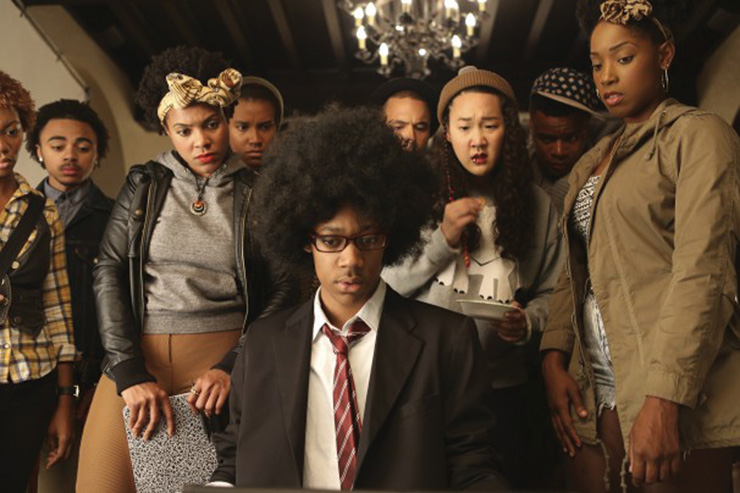Naomi Ko, starring in the highly anticipated Dear White People, talks about how race still matters in 2014.
by JAMES S. KIM
When 23-year-old actress Naomi Ko was in Los Angeles this past December, she didn’t expect fellow Korean Americans to be so confused when they met her. “Were you adopted?” they would ask. When she would reply no, they would follow up with, “Then why do you choose to live in the Midwest?”
The questions don’t really faze the Twin Cities native, who is proud and has firmly embraced her identity as a Korean American Minnesotan, elongated vowels and all. Racial identity is a theme she has dealt with personally as well as professionally as a theater actress and writer. This theme continues with Ko’s film debut in Dear White People, which makes its world premiere at the Sundance Film Festival this weekend.
There is a palpable buzz about the film, which is described as a tongue-in-cheek “satire about being a black face in a white place.” Dear White People has sold out all five screens during its run at the 10-day festival. Unlike historical narratives 12 Years a Slave and The Butler, Dear White People is more along the lines of Spike Lee’s Do the Right Thing in addressing racial identity in a contemporary setting with a more nuanced racial dynamic, which Ko found more applicable to her own experience.
“Dear White People really hit home, in the sense of what it’s like to be a minority in such a white world,” Ko told KoreAm. “You may have a particular theme where somebody wants to touch one of the African American character’s hair. I feel like it’s very easy to switch that out and say, ‘Oh, where are you from?’ It’s a question that I’m asked many times, even though I was born in Minnesota.”
With a cast that includes Tyler James Williams (Everybody Hates Chris), Tessa Thompson (Copper, Veronica Mars) and Dennis Haysbert (The Unit, 24), Dear White People is the brainchild of director Justin Simien, who peppered some of his own experiences into the script. The film is told through the perspectives of four black students who attend a fictional, predominantly white Ivy League-esque school called Winchester University.
Ko’s character stands out from the crowd: Sungmi is a Korean American art major with a lip ring who lives in a predominantly African American dorm and hangs out with mostly black students.
“In terms of being a racial icebreaker, Sungmi’s Asian American/Korean American identity is not brought into the same question [as those of the four black students],” she explained. “She’s just who she is … we never really see Sungmi struggle with her identity.”
In contrast, the few black students at Winchester University end up dealing with the aftermath of an on-campus racially-themed costume party. But Dear White People isn’t specifically about racism, as the director has made clear. Simien’s film will look to start up a dialogue about racial identity and how an individual comes to contextualize oneself when mainstream society reacts to them based on their race.
“I think it is the first film that really talks about race in the post-2008, Barack Obama-being-elected-as-president [era],” Ko said. “[It’s about] what it’s like to be a person of color in a contemporary time. I think that it’s very relevant in that sense, because people like to say, ‘Oh, racism doesn’t exist because we elected Barack Obama as our president,’ and that’s not really the case. The film really explores that these issues are still happening, but in a different way.”
With her piercings and cool, calm demeanor, Ko describes Sungmi as a “really cool badass” who doesn’t fit any of the Asian American college student stereotypes. Ko may not be as off-kilter, but as a University of Minnesota graduate who studied art history and ended up as a writer and actor, she’s not exactly fitting the model minority mold either, which she says is reflected in her body of work.
“I’d like to think that when I write, I should write about what I know, and my life is what I know, and these issues of identity do come up,” said Ko, who is currently working on her latest project, My Celebrity Sex List, which touches upon how Asian American sexuality is portrayed.
“I do write a lot about being a millennial, being a millennial from the Midwest,” she said, “who is also Asian and Korean American. … These topics are really important to me because I’m a writer/performer, so what I see on stage in Minnesota, and also in the United States in terms of the Asian American experience, is not very reflective of that. It’s something I want to talk a little bit more about.”
You can find out more about the film at the Dear White People website and the Sundance Film Festival website.
Film still by Ashley Beireis Nguyen.
This article was published in the February 2014 issue of KoreAm. Subscribe today!To purchase a single issue copy of the September issue, click the “Buy Now” button below. (U.S. customers only. Expect delivery in 5-7 business days).








